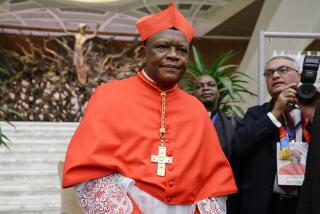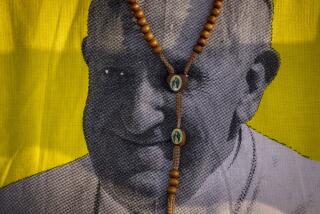RELIGION : African Bishops Seek to Match Faith With Needs of Continent : Participants at Vatican gathering spotlight traditions.
- Share via
VATICAN CITY — Summoned to Rome by Pope John Paul II for a special congress, Roman Catholic bishops from Africa are seeking to match the demands of their faith with the social, political and economic needs of a hungry and often violent continent.
For about 300 bishops from the 53 nations of Africa attending a monthlong synod here, “inculturation”--melding Catholicism with African traditions--emerged as an overriding concern. “It is the marriage of faith and life,” said the group’s interim document.
Relentless inter-ethnic violence in Rwanda, the most Christian country in Africa, is a tragic counterpoint to the synod’s exaltation of a continent where Catholicism is growing quickly and the Vatican counts 80 million believers among 610 million people.
A practical advantage of holding the synod in Rome is that it exposes the stay-at-home Vatican curia directly to the African church. And such meetings provide a valuable chance for participants to compare notes.
“Exploration of common problems by bishops who didn’t necessarily know one another should result in a stronger African church,” said Rev. Tom Reese, a California Jesuit who is following the synod as a specialist in church organization.
The secular context for a church transported to Africa in the last century by European missionaries emerges with painful clarity as the bishops--90% of them Africans--recite a litany of continental needs.
“In almost all our nations, there is abject poverty, tragic mismanagement of available resources, political instability and social disorientation,” noted Cardinal Hyacinthe Thiandoum of Senegal.
Part of the blame rests with Europe and North America, which contribute material assistance to Africa but are also responsible for “bombs and weapons to destroy our people, and to create insoluble debts,” observed Mozambique Cardinal Alexandre Jose Maria dos Santos.
The burden of responsibility for African trauma, however, rests heaviest not on outsiders but on African political leaders, the bishops warned. Bishop Julius Babatunde Adelakun of Nigeria assailed leaders who “are power hungry, greedy, corrupt, having enriched themselves at the expense of the people they are supposed to serve.”
The bishops said that Catholic teaching must be presented “as a message of liberation and salvation. Justice and peace is at the heart of the mission in Africa. There is a need for a new cultural politics which accepts pluralism, diversity and democracy.”
A 34-point working agenda notes the great religious enthusiasm of Africa but also worries about a “shallow faith” among some African Christians--what one bishop called “rosary beads in the morning, witchcraft in the afternoon.” Bishops have been stunned by missionaries’ reports that both catechists and regular worshipers in Catholic communities in some cases participated in the Rwanda slaughter of minority Tutsi by majority Hutus.
The bishops’ agenda observes that since the history of the church on their continent is short, among Africans there is “a strong feeling of having received a faith not yet fully at home in our life and culture.”
It is in everyday practicalities such as liturgy, marriage and reverence for ancestors that Catholicism must most directly adapt to African realities, bishops say. They encourage a meeting ground with traditional rites representing “the reservoir of African religions and cultural values.”
“Christ walks too much among the people in a European garment,” said Bishop Bonifatius Haushiku of Namibia. One result, said Bishop Francis Mugadzi of Zimbabwe, is that Christians lead “double lives, one foot in African tradition, another one in the church.”
More to Read
Sign up for Essential California
The most important California stories and recommendations in your inbox every morning.
You may occasionally receive promotional content from the Los Angeles Times.












